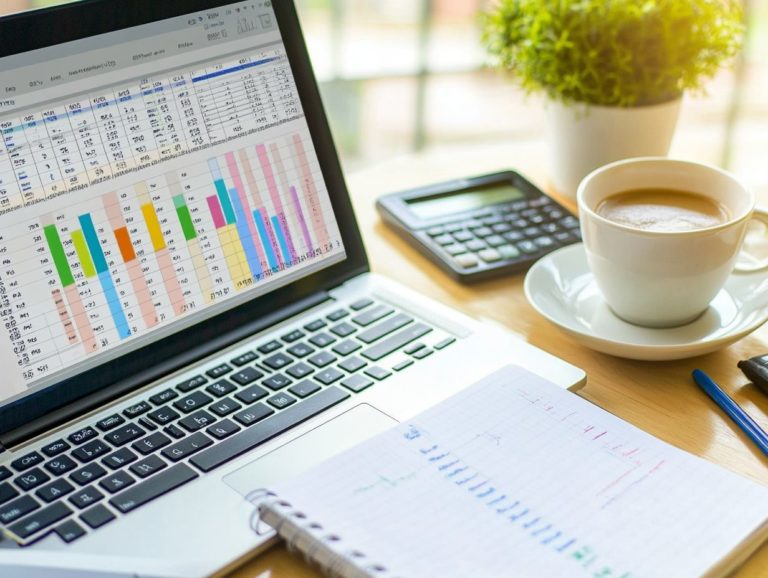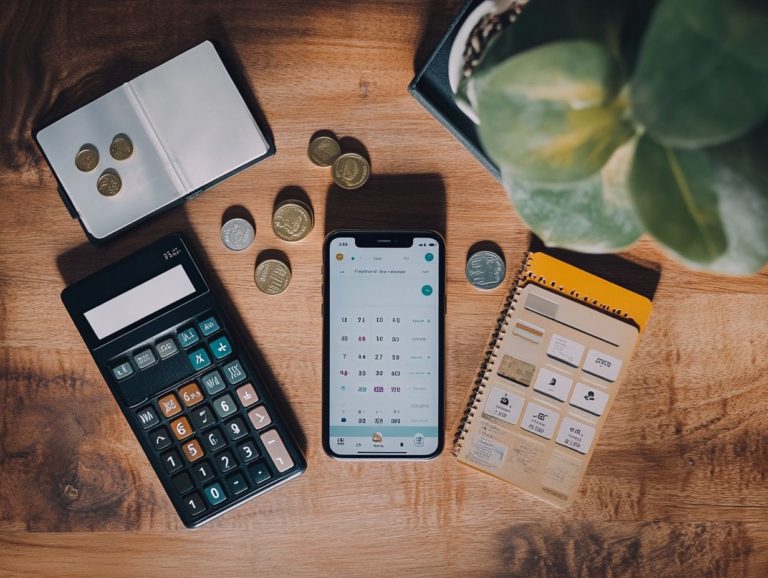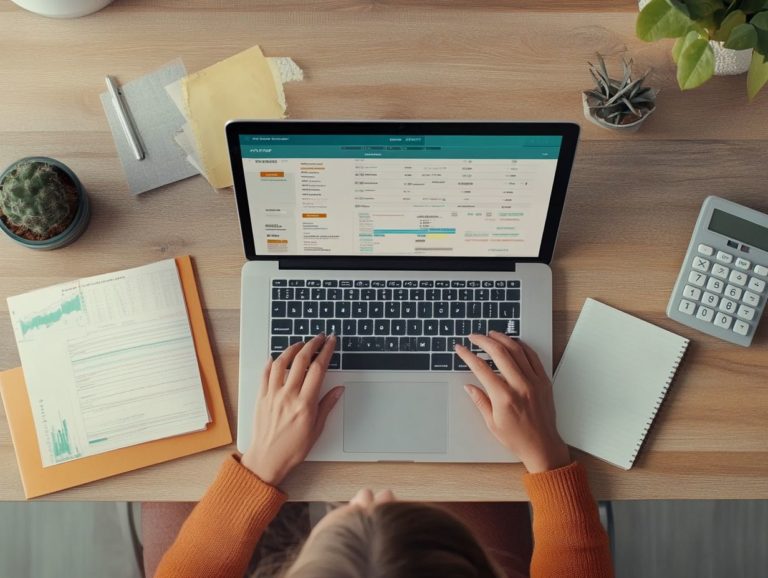How to Track Your Financial Progress with Apps
Tracking your financial progress is essential for attaining long-term financial success.
In today s tech-savvy world, a myriad of financial tracking apps can make this task remarkably easier, whether you re budgeting, managing investments, or working on debt reduction.
This article delves into the fundamental reasons for keeping tabs on your finances, showcases the various app options at your disposal, and outlines key features to consider when selecting the right one for you.
You ll discover practical tips for using these tools and other ways to track your finances.
Dive into this guide and take charge of your financial future!
Contents
- Key Takeaways:
- The Importance of Tracking Financial Progress
- Types of Financial Tracking Apps
- Features to Look for in a Financial Tracking App
- How to Effectively Use a Financial Tracking App
- Other Methods for Tracking Financial Progress
- Frequently Asked Questions
- How do I track my financial progress using apps?
- What are the benefits of using apps to track my financial progress?
- Which types of apps are best for tracking financial progress?
- Can I track my financial progress using multiple apps?
- Do I need to pay for apps that track financial progress?
- Are there any privacy concerns when using apps to track financial progress?
Key Takeaways:
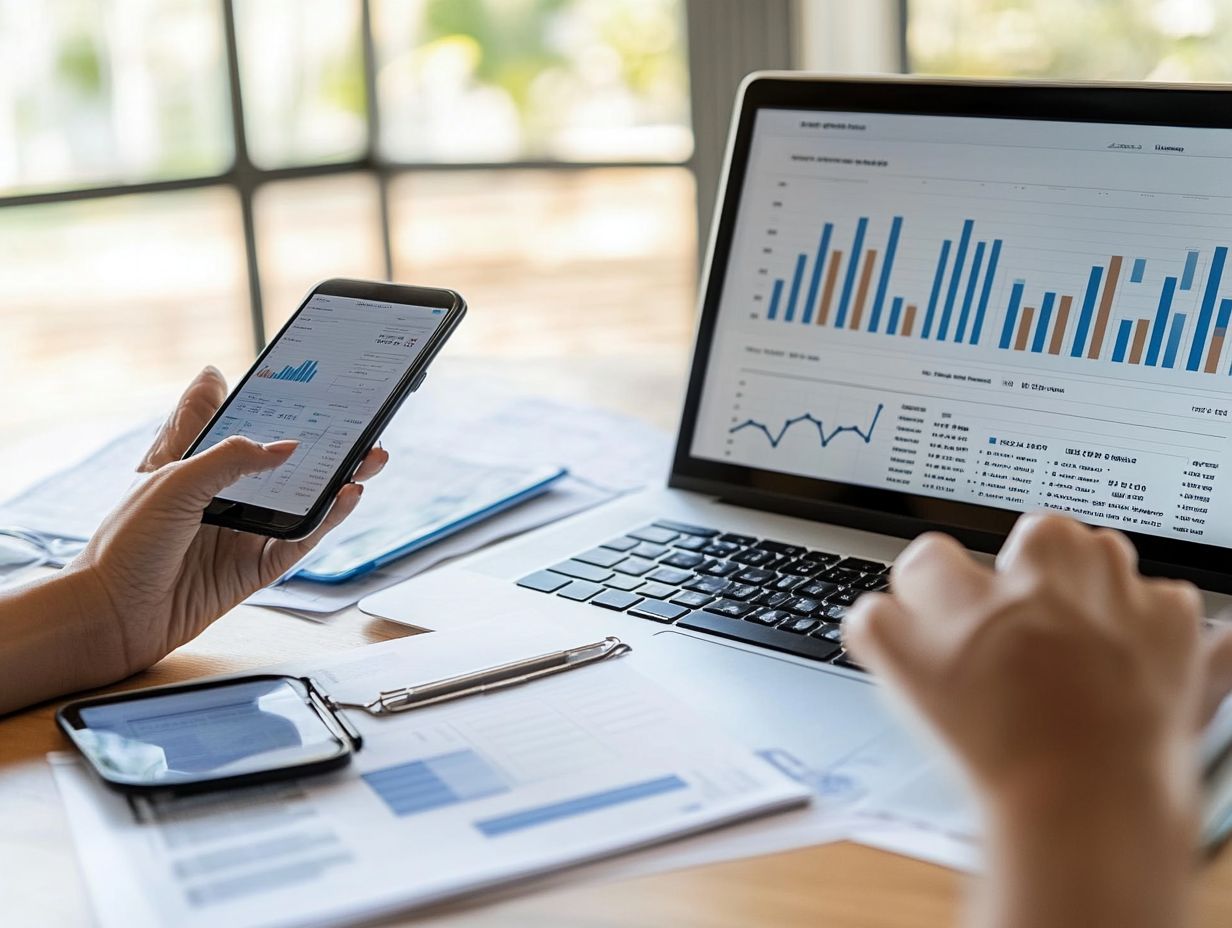
- Track your financial progress with apps to achieve financial success.
- Select a user-friendly app that is compatible with your financial accounts and has strong data security measures.
- Effectively use a financial tracking app by setting goals and budgets, and regularly updating and reviewing your progress.
The Importance of Tracking Financial Progress
Tracking your financial progress gives you and your partner a clear view of your financial landscape, allowing you to manage household bills, savings, and investments with confidence.
By utilizing top-notch budgeting apps, you can uncover insights into your spending habits, set long-term financial goals, and elevate your discussions with financial advisors.
Moreover, keeping an eye on your finances can help you pinpoint areas where you might tweak your budgeting strategies to achieve greater financial stability or even prosperity. As we move into 2024, the need to monitor personal finances will only increase as new budgeting tools emerge to cater to the needs of the digital age.
Why Tracking is Essential for Financial Success
Tracking your financial progress is crucial for achieving the success you desire. It gives you the power to understand your spending habits and manage household bills with greater efficiency.
By utilizing various budgeting apps, you can gain valuable insights into your income and expenditures, making it much easier to spot trends and identify areas where you can cut back. This awareness becomes the foundation of effective budgeting strategies, enabling you to make informed financial decisions that align with your personal goals whether that’s saving for a vacation, paying off debt, or building that all-important emergency fund.
Financial advisors can refine this process, offering tailored strategies and expert advice. By combining these tools and insights, you can not only keep a pulse on your current financial health but also chart a clear course toward achieving your long-term financial aspirations.
Types of Financial Tracking Apps
In today’s complex world of managing your money, you ll find a plethora of financial tracking apps designed to meet a range of needs. From budgeting apps tailored for 2024 to investment tracking solutions and debt management tools, each one is crafted to simplify your financial oversight and enhance your control over your monetary landscape.
Budgeting Apps
Budgeting apps like Rocket Money, YNAB (You Need A Budget), and Honeydue are excellent tools for anyone looking to take control of their personal finances.
What sets these applications apart are their distinct features tailored to meet diverse financial needs. For instance, Rocket Money introduces you to zero-based budgeting, which means every dollar you earn is assigned a specific purpose, ensuring that nothing goes to waste. On the other hand, YNAB champions customizable budgeting that adapts to your unique lifestyle and spending habits, making financial management more personal and relevant to you.
Honeydue shines when it comes to collaboration for couples, allowing you to track shared expenses with ease. Users often rave about the intuitive interfaces and robust security measures think encryption and biometric access instilling confidence in your financial management journey. These apps not only streamline your budgeting process but also boost your financial awareness and accountability.
Investment Tracking Apps
Investment tracking apps are essential tools for you if you’re looking to visualize and manage your investment portfolio while aligning it with your long-term financial goals.
These applications come packed with functionalities like tracking prices as they change, performance analytics, and diversified asset tracking. They are all designed to provide you with valuable insights into your investment strategies.
With automatic updates and notifications, these tools keep you informed about market changes and help you make timely decisions.
Many investment tracking apps also integrate seamlessly with budgeting applications. This allows you to adopt a comprehensive approach to financial management.
This integration enables you to monitor your spending patterns alongside your investment performance. As a result, you can set realistic savings goals while strategically investing your assets.
Debt Management Apps
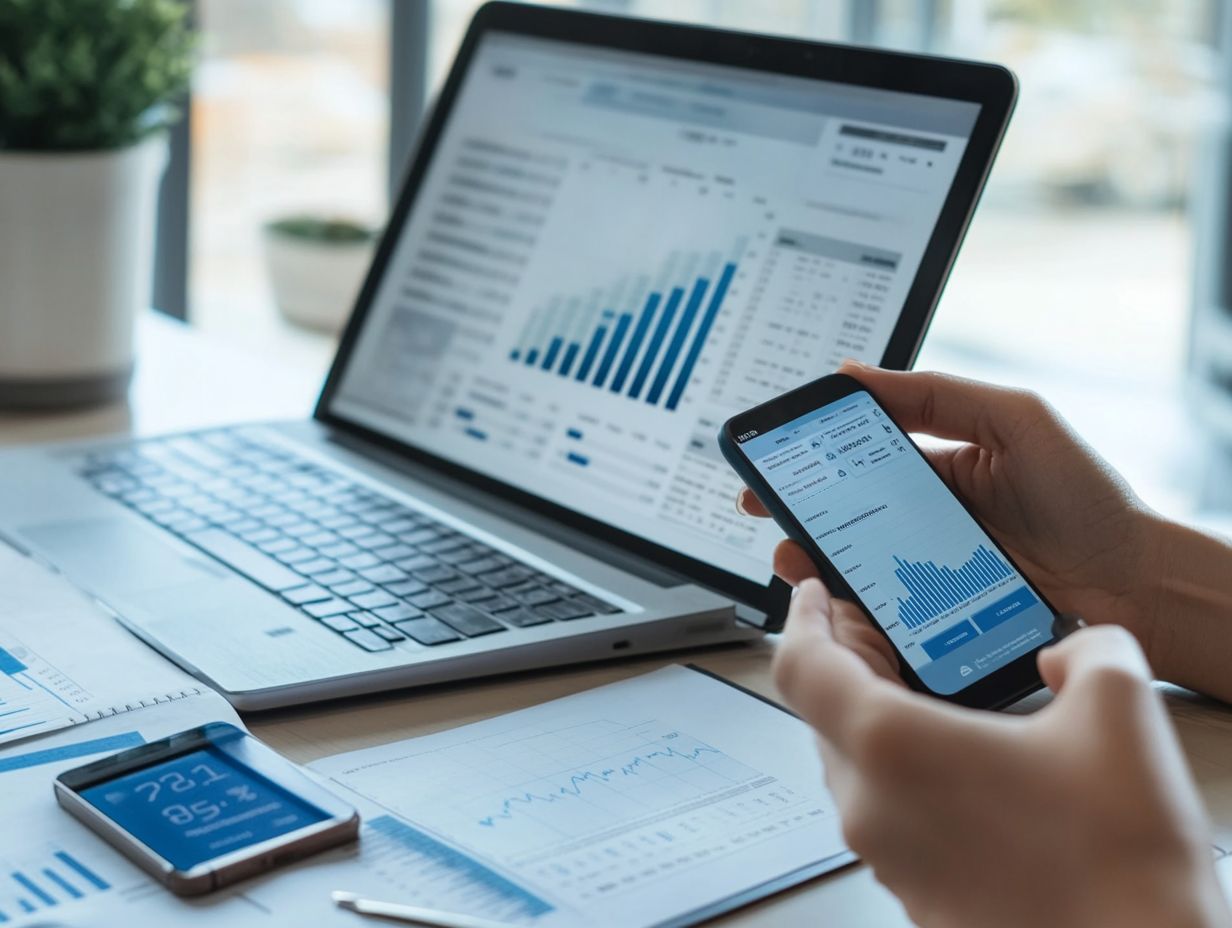
Debt management apps serve as essential tools for those looking to take charge of their finances by effectively tracking spending and negotiating bills.
These innovative applications streamline the monitoring of your expenses. This enables you to categorize your spending habits and pinpoint potential areas for improvement.
These apps can work with financial advisors to create repayment plans just for you that align with your unique financial situation.
Equipped with tools that automate payment reminders and offer actionable insights into debt reduction strategies, you’ll find it much easier to stay focused on your financial goals.
Ultimately, the collaboration between these apps and financial experts is crucial in paving your path toward long-term financial freedom and security.
Features to Look for in a Financial Tracking App
When choosing a financial tracking app, it’s essential for you to consider several key features.
- User-friendly interface that makes navigation effortless.
- Robust account integration to consolidate your finances seamlessly.
- Strong security features to safeguard your sensitive financial data, giving you peace of mind as you manage your financial landscape.
Start exploring these features today for financial peace of mind!
User-Friendly Interface
A user-friendly interface in financial tracking apps greatly enhances your experience in managing personal finances. It makes budgeting tools accessible regardless of your skill level.
With an intuitive navigation system, you’ll quickly find the features you need without unnecessary clicks. This reduces frustration and saves you valuable time.
Additionally, a visually appealing design boasting clear charts, engaging colors, and legible fonts turns your interaction with the app into a more enjoyable experience.
These elements work together to streamline the process of tracking expenses and setting budgets, allowing you to make informed financial decisions with confidence.
When these thoughtful design principles are in place, they lead to more effective financial management and a satisfying user experience. This keeps you engaged and motivated to reach your financial goals.
Compatibility with Different Financial Accounts
Compatibility with various financial accounts is an essential feature for budgeting apps. It enables you to manage your finances effortlessly in one place and make informed decisions.
By seamlessly integrating checking accounts, savings accounts, and even investment portfolios, these apps allow you to obtain a comprehensive view of your financial landscape.
This interconnectedness not only streamlines your expense tracking but also enhances budgeting accuracy by automatically categorizing transactions.
With a unified platform at your fingertips, you can easily identify spending patterns and areas for improvement. This simplifies the process of setting and achieving your financial goals.
Thanks to real-time updates across your linked accounts, you can stay on top of your finances more effectively. This fosters enhanced financial discipline and greater peace of mind.
Data Security Measures
Data security measures are essential in financial tracking apps. They protect your sensitive information while enabling you to make the most of budgeting tools.
These measures include strong encryption methods that safeguard your personal and financial data from unauthorized access. A system that requires two steps to verify your identity adds an extra layer of security.
These features are not just important for maintaining your privacy; they also cultivate trust in these applications. When you feel confident about the protection of your data, you’re more likely to engage with budgeting tools and achieve your financial goals. This leads to better decision-making and an overall improvement in your financial health.
How to Effectively Use a Financial Tracking App
Start today by setting clear goals and budgets to take control of your finances! To make the most of a financial tracking app, begin by establishing clear goals and budgets. Regularly updating your financial data is crucial, as it ensures you have the most accurate picture of your finances.
Periodically reviewing your progress helps you stay aligned with your financial strategies. This allows you to make informed decisions and adjustments as needed.
Setting Goals and Budgets
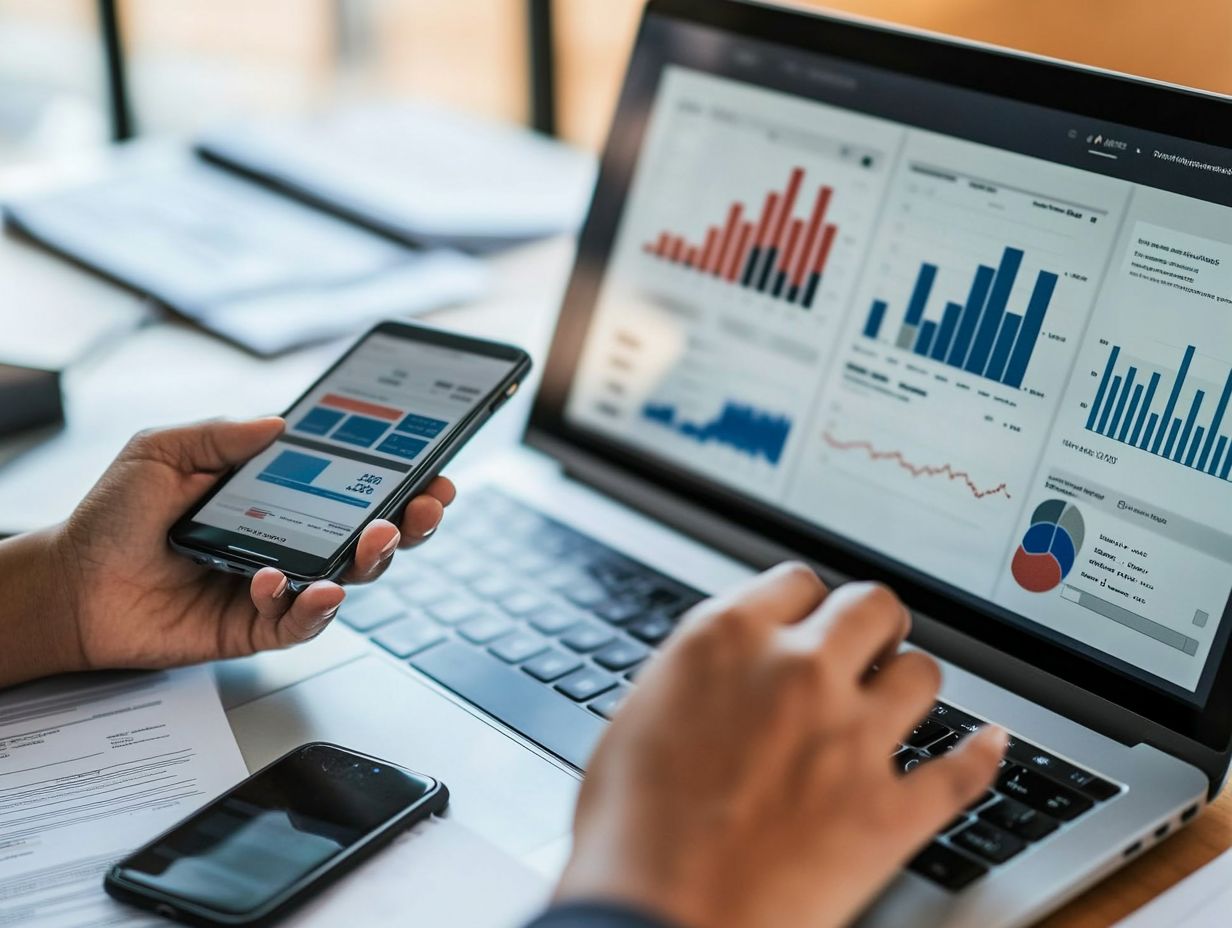
Setting goals and budgets is a crucial first step in your personal finance journey. They serve as a compass to guide you toward achieving your long-term financial aspirations.
Financial tracking apps offer many ways to customize your goals to fit your unique needs, whether it’s establishing savings targets, outlining debt repayment plans, or identifying investment milestones. By weaving these personalized objectives into your budgeting strategy, you can cultivate a strong sense of accountability and motivation.
Breaking down larger goals into smaller, manageable tasks transforms the journey from daunting to attainable. Celebrate each incremental success along the way. The combination of clear goals and effective budgeting sharpens your financial literacy and fosters a more disciplined approach to both spending and saving.
Regularly Updating and Reviewing Progress
Regular updates clarify your financial situation and help you spot trends. This is essential for maintaining a clear picture of your finances and effectively monitoring your spending.
Engaging in periodic reviews reveals areas that may require adjustments. By spotting unexpected expenses or shifts in income, you can simplify the process of adjusting your budget as needed. These insights pave the way for meaningful discussions about your financial goals, ensuring your spending habits align with your overarching objectives.
Leveraging features like trend analysis and forecasting tools within the app empowers you to make more strategic decisions about resource allocation and saving for future aspirations.
Other Methods for Tracking Financial Progress
Alongside utilizing financial tracking apps, consider exploring manual tracking methods that allow for a hands-on approach. You might also think about the best tools for tracking financial goals or hiring a financial advisor who can provide tailored guidance to suit your situation.
Manual Tracking Methods
Manual tracking methods present a sophisticated alternative for managing personal finances. They allow you to engage directly with your budgeting tools.
These techniques can range from maintaining a meticulous ledger to using spreadsheets that log your income and expenses with precision. This hands-on approach fosters a heightened awareness of your spending habits, revealing insights that automated systems might overlook.
For those who thrive on tangible interactions, these manual methods serve as an excellent complement to financial tracking apps. They provide a valuable backup perspective. You can harness the data from both avenues to identify trends and refine your financial behaviors.
To elevate your financial management, consider setting regular review sessions or implementing color-coded systems. This enhances organization and brings clarity to your financial journey.
Hiring a Financial Advisor
Hiring a financial advisor can provide invaluable insights and tailored strategies for managing your finances. This is especially true if your situation is complex.
These professionals are experts in areas like investment planning, tax strategies, and retirement preparation. Their knowledge can be a game-changer for your financial journey.
By evaluating your current financial health and setting realistic long-term goals, they empower you to make informed decisions. This ensures your plans align with your aspirations.
With their guidance, you re more likely to stay on track, adapt to changes, and feel at peace about your financial future.
Frequently Asked Questions
How do I track my financial progress using apps?

To track your financial progress using apps, download a budgeting or money management app on your smartphone or tablet. These apps allow you to input your income, expenses, and savings goals to monitor your progress over time and learn how to use personal finance apps effectively.
What are the benefits of using apps to track my financial progress?
Using apps to track your financial progress offers many benefits. You can easily see your spending habits, set and monitor savings goals, and explore how to use financial apps to boost your savings, receiving personalized recommendations for improving your finances.
Which types of apps are best for tracking financial progress?
There are many types of apps available for tracking financial progress, including budgeting apps, investment tracking apps, and personal finance management apps. To enhance your tracking skills, consider learning how to track your savings progress effectively. It’s essential to research and choose the app that best fits your financial goals and needs.
Can I track my financial progress using multiple apps?
Yes, you can track your financial progress using multiple apps. Some people prefer using different apps for different aspects of their finances, such as one app for budgeting and another for tracking investments. To effectively monitor your journey, consider using a financial goals checklist.
Do I need to pay for apps that track financial progress?
Some apps that track financial progress may require a one-time purchase or subscription fee, while others are free to download and use. It’s important to consider the features and benefits of each app before deciding whether to pay for it.
Are there any privacy concerns when using apps to track financial progress?
As with any app or online service, carefully review the privacy policies and terms of use before providing personal financial information. Look for apps with strong data encryption and privacy measures to ensure the security of your information.
Ready to take control of your finances? Explore the right app for you today!

